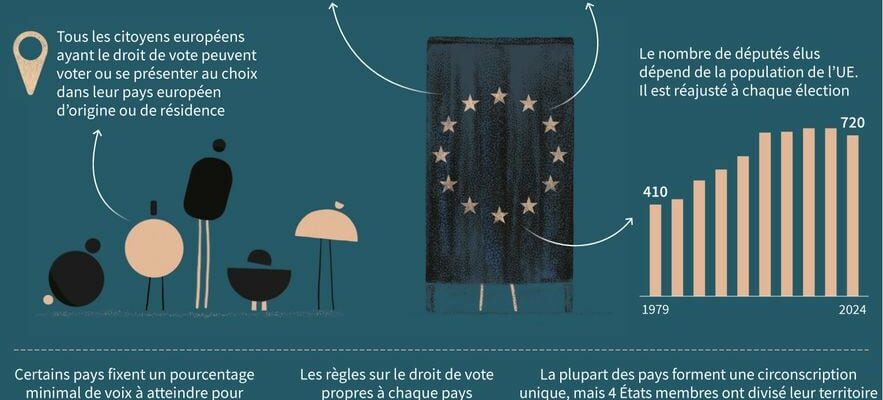From June 6 to 9, nearly 360 million voters, out of 450 million Europeans, are called to vote to elect 720 European deputies. But if the 27 countries of the European Union must respect a certain number of common rules, such as direct universal suffrage, proportional representation or a renewable 5-year mandate, States can also put in place specific rules.
On the ballot, first of all, three models coexist. In 19 states including Italy, Poland, the Netherlands and the Nordic countries, voting is called “preferential”: the voter can, depending on the country, modify the order of the list of candidates for which he or she votes. , cross out candidates or even combine several lists.
In France, Germany and Spain, voting is on the contrary by “blocked lists”: voters vote for lists whose order or composition they cannot modify. In Malta and Ireland, the voter does not vote for an already constituted list, but draws up his own list by ranking the candidates in order of preference: this is then called a “single transferable vote”.
The voting method for the European elections
© / AFP
Another divergence: only four countries – Italy, Poland, Belgium and Ireland – have divided their territory into constituencies. These administrative subdivisions are geographical, except in Belgium where the colleges are linguistic (Dutch-speaking, French-speaking and German-speaking). In other countries, voters vote in a single national constituency. France, for its part, had set up interregional constituencies for the 2009 and 2014 elections, a system which has since been abandoned.
Compulsory and postal voting
Voting is also compulsory in four countries: Belgium, Greece, Bulgaria and Luxembourg. The obligation applies to nationals and Union citizens registered on the electoral lists of these countries. In the event of non-compliance with this rule, Belgium provides in particular for a reprimand or a fine of 40 to 80 euros, unless the justice of the peace considers that the reasons which led the person not to vote are well-founded. However, these sanctions are rarely applied.
Voting by mail is permitted in 13 countries of the Union, most of the time to allow citizens residing abroad to vote. This is particularly the case in Germany, Spain and the Nordic countries. Five countries authorize voting by proxy, for all voters (France, Netherlands, Belgium) or only for elderly or disabled voters who cannot travel (Poland, Sweden). Only Estonia, a country at the forefront of digital technology, allows its citizens to vote online.
Finally, on representativeness, ten countries impose gender quotas on candidate lists. The French, Italian, Belgian and Luxembourg lists must be equal. In Spain, Portugal, Greece, Slovenia and Croatia, the lists must contain at least 40% of candidates of each sex, in Poland 35%. In Romania, a law is supposed to promote balanced representation of men and women on the lists, but its wording, vague and not quantified, makes it ineffective. With only 15% women, the Romanian contingent of MEPs is the least feminized in the European Parliament. In fact, of the three countries with the most female contingents of MEPs, two achieve this without a quota: Finland (57% women) and Sweden (52%). Luxembourg is ahead of them, however, with 67% women.
